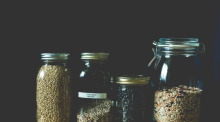Breast Cancer and Soy: Risks or Benefits?
Is COVID-19 Making You Gain Weight ? Dietitian Advice
Vitamin D - A Practical Guide
Grapefruit and Medication
Gluten Free Flours: The Benefits of Other Grains
Mental Health at the Heart of Corporate Concerns
Nutrition and Breast Cancer: Key Points to Reduce Risk
Breast cancer remains a dominant and concerning disease, with an estimate that about 1 in 8 Canadian women will be diagnosed with it in their lifetime [1]. Despite progress over the years, there's an ongoing need for awareness and prevention. In honour of Breast Cancer Awareness Month, here are some key factors to consider that could help reduce your risk of developing this disease.


















